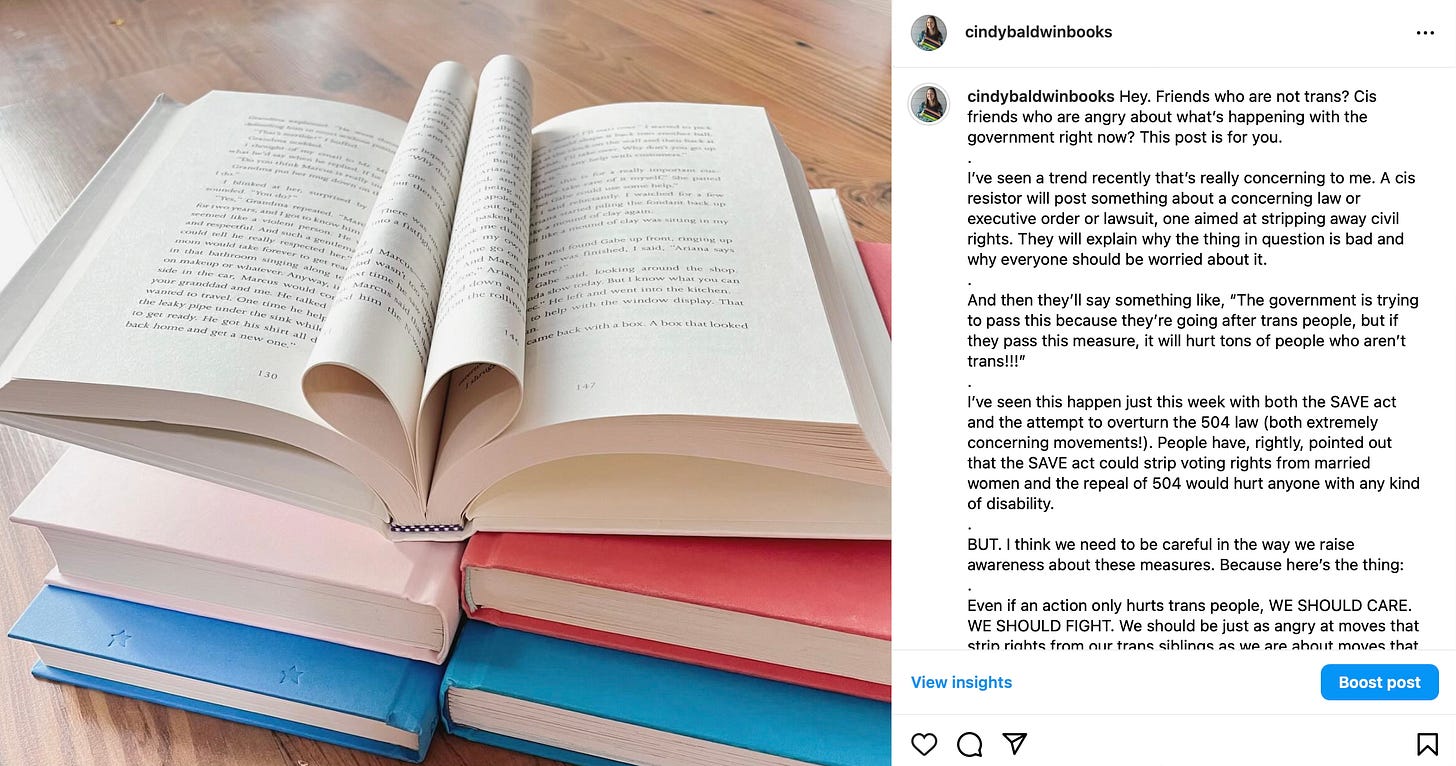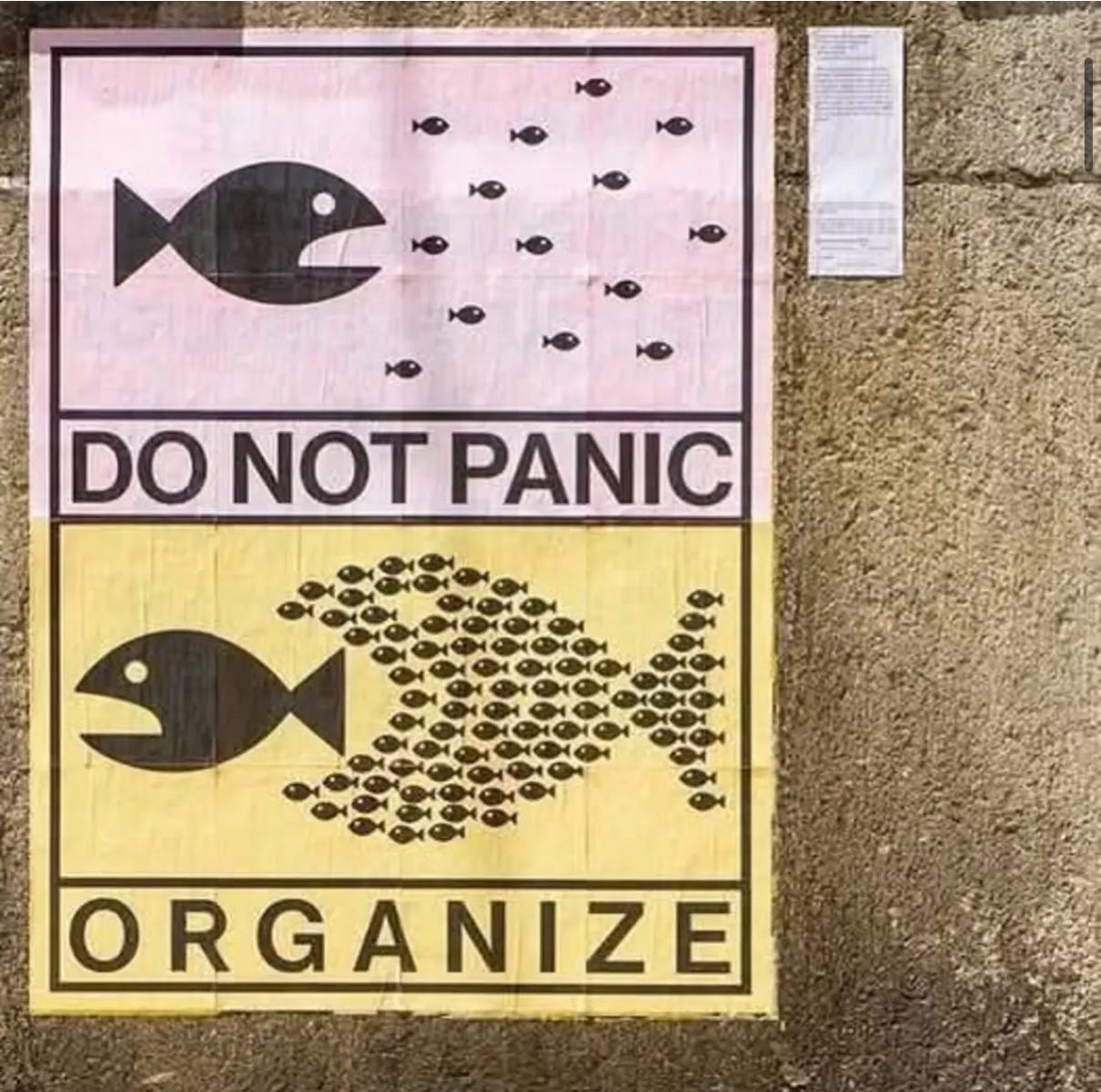The Nightlock-Berry Theory of Collective Liberation
We do not beat fascists by conceding to their rules.
The other day I made an Instagram post asking liberals not to throw trans people under the bus when they’re trying to point out the broad reach and impact of anti-civil rights legislation being proposed. I pointed out that I’d started seeing a pattern in which liberal resistors posted about things like the SAVE act or the lawsuit attempting to repeal Section 504—both deeply disturbing pieces of legislation!—and described the bill by saying things like, “The government is trying to pass this because they’re going after trans people, but if they pass this measure, it will hurt tons of people who aren’t trans!!!”
My point with the post was that even if a measure only hurts trans folks, we should care. If we are truly liberal-minded people who want to help marginalized groups, we can’t imply that it’s okay for some marginalized groups to be targeted as long as we, ourselves, are safe.
I got some pushback against the way I worded the post, with several people pointing out the sadly accurate truth that many people do not care about an issue unless it affects them, and therefore pointing out how it will hurt somebody is often the best way to get them to pay attention and take action. I think that’s very true—in responses to these friends, I clarified that I don’t think there’s anything wrong with providing context like “the SAVE act could prevent married women who have had a legal name change from voting.” I just think we can do it without bringing trans people into it in a way that implies that their loss of voting rights would be acceptable collateral.
On the same day these conversations were happening, my daughter finished her first read-through of The Hunger Games. (If you know my kid, you can accurately guess that she was instantly obsessed. Intrigue, gore, a tyrannical government, and a misanthropic heroine with a bow are very her speed.) As I watched her reaction to the end of the book, I found myself thinking a lot about the climactic scene in The Hunger Games, in which Peeta and Katniss threaten to eat poisonous nightlock berries if the creators of the Hunger Games don’t let them both leave the arena alive, even though that expressly violates the primary rule the Hunger Games has abided by for 73 years. Ultimately their stunt works; the gamemakers get them out of the arena, and both Peet and Katniss are allowed to go back to their homes. All because they were willing to say, to their leaders and the world: We survive together, or not at all.
Katniss and Peeta beat the Hunger Games because they did not accept the framework they were given. They were not willing to play by the rules of the totalitarian fascist government that planned to force them to murder each other on live TV. They were willing to gamble both of their lives on an audacious move to wrest power back from the system and ensure that they were both liberated. Katniss, deeply shaken by the loss of her young friend Rue earlier in the book, can clearly see that the system in which she was raised is one where the house always wins, the people have no power, and even if you win the Hunger Games, you lose—lose your humanity, your illusions of control, and your very personhood.
Katniss isn’t willing to play that game anymore. And it’s her turn away from the rugged individualism the Hunger Games demands, her turn toward collective liberation, that allows her to triumph… and lights the spark that will eventually overturn the dictatorship in control of Panem.
This is what I’ve been thinking about all week:
We do not beat fascists by playing by their rules.
The Republican establishment, along with many conservative movements across the world, have spent the last decade trying to convince us that we are in an inescapable battle between the rights of trans people and the rights of women. Many people who claim the label of “feminist” have tried to insist that the existence of trans people, and their access to equal rights, strips away hard-won rights for women. This is simply not true. Vast amounts of data show that trans women do not outcompete cis women in sports; that trans women do not attack cis women in bathrooms; that the empowerment of trans women, trans men, and nonbinary people does not cost cis women anything. In my experience, as well as in many others’, trans and nonbinary people are often the fiercest defenders against gendered violence and discrimination. As I shared in my last newsletter, liberation is a group project.
Beyond this specific conflict, the last decade (and the arc of history in general) has seen many, many attempts to pit various marginalized communities against one another. If we are too busy fighting amongst themselves, competing for the scraps we are offered, we are not strong enough to collectively resist authoritarian rule.
But I truly believe this: If we accept the premise that the Hunger Games can have only one victor, we will end up with blood on our hands.
I am disabled. Most of my adult life has been spent in advocacy for disability rights. Sometimes this is an incredibly empowering experience; more often, it’s demoralizing and exhausting. I’ve been trying to get people to understand the direness of threats to lives like mine since I was 19, and folks, I’m so tired. Sometimes, in my most overwhelmed moments, that tiredness can breed in me a feeling of scarcity. More than once, I’ve looked around at liberal movements and felt betrayed by how often disability is forgotten when people are advocating for other marginalized groups.
More than once, I’ve found myself falling prey to the Hunger Games mentality: There isn’t enough support for all of us.
But I can also say, I have never made inroads in my activism by trying to pit myself against other marginalized people. And often, the greatest support and allyship I’ve experienced have come from non-disabled people from other marginalized groups—Black people, Indigenous people, people of color, trans people, queer people.
As a disabled person, I’ve spent my life keenly aware of the abilities I lack. I can’t work a real job. I can’t parent multiple children. I couldn’t graduate college. Half the time I can’t walk. I can’t survive without sleeping more than half my life away. I can’t do anything that takes more than ninety minutes without risking collapse. I’ve thought a lot about what I would do in an apocalyptic situation, and the answer is usually: “die quickly.” I probably wouldn’t last a day in the Hunger Games arena.
But a few years ago, I learned about the 504 sit-ins—a protest movement that led to the adoption of Section 504, the rule that mandates that institutions that receive federal funding must provide integrated services to people with disabilities. (Yes, the exact rule that is currently under attack. I’ve written a Facebook post about that issue, with action steps and email scripts you can use to fight for the protection of Section 504.) The 504 protests included an occupation of a federal building in San Francisco that remains the longest sit-in at a federal building to date. More than 150 disability activists—many of them disabled—occupied the San Francisco Federal Building for 26 days to advocate for the rule to be passed.
The Wikipedia article on the sit-ins says, “Because many had entered the building without their usual care-takers, they turned to their fellow occupiers to assist them in the tasks of daily living. Blind people became attendants to quadriplegics who in turn read printed information to the blind people. This created strong bonds among the protesters and educated them about disabilities other than their own.”
And it wasn’t only the disability community who was involved. The movement was led primarily by queer disabled women, who intentionally built coalitions with other organizations and interest groups. The Black Panthers, using their successful community meal program, provided daily hot meals to the occupiers. The Salvation Army provided the group with bedding. Many other groups helped to support the sit-in with letters of support, visits to congresspeople, and other assistance. Without these successful coalitions, the movement likely would not have been successful—but because of the successful interdependent systems set in place, the protest resulted in the passing of Section 504, a landmark moment for disability rights.
Learning about this moment in history was life-changing for me. I had spent my whole life paying attention to the things that I, as an individual, could not do. I had assumed that there would be no way I could ever survive something like the 504 sit-in. But learning this story showed me that my perspective was wrong. Sure, I could not, myself, do a lot of things. But together—with other disabled people and nondisabled allies—I can do a lot.
Other marginalized groups are not a threat to me. I do not buy into the framework that I’ve been presented with—the idea that we are in a Hunger Games in which we have to throw one another under the bus to preserve our rights. I reject the idea that we have to cut important programs such as DEI initiatives, Medicaid, or Section 504 to save money, while billionaires pocket literal millions of dollars per day from our government. I refuse to step on the shoulders of my peers to try to save my own life.
Instead, I’m sticking with what I’ll call the Nightlock-Berry Theory of Collective Liberation: that the only way to succeed is to turn to the cameras and say, We are only free if everyone is free.
The 504 sit-ins could never have succeeded without the support and meals from the Black Panther party. Many of the victories that women have won in past decades have been championed by trans people and gender nonconforming people who want to be seen as more than simply a gender. We do not have to accept the idea that human rights are a dichotomy, and we have to choose the winners and losers.
"Equal rights for others does not mean fewer rights for you. It's not pie." -Jesse Williams
Poetry Corner:
Today I’m sharing this gorgeous spoken-word poem by Maya Wilson. It speaks beautifully and heartbreakingly to where I’m at mentally this week.
Call to Action:
Two crucial pieces of disability legislation are under attack right now. Can you do two things for me today?
Read this post about the lawsuit against Section 504 and contact your attorney general using this script.
Contact your senators and representatives and ask them to vote against any federal budget plan that includes cuts to Medicaid. The new budget proposal Republicans unveiled this week will completely decimate Medicaid, which will not only remove health care access from hundreds of thousands of Americans, but also absolutely crater the entire American health system, which heavily relies on Medicaid payments to stay afloat. You can find information and a script for that here.








I love that fish image—it’s so accurate to how I’m feeling right now. Thank you, friend.